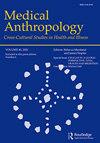来吧:生活与肺癌在康复的另一面在丹麦。
IF 1.2
3区 社会学
Q2 ANTHROPOLOGY
引用次数: 0
摘要
癌症的不平等通常被定义为死亡率、发病率和治疗方面的差异。癌症康复的目的是帮助癌症患者尽可能过上最好的生活,无论他们的背景如何。在这项研究中,我探讨了不参与康复的肺癌患者如何感知和驾驭日常生活。我用“传记中断”、“传记流动”和“挣扎”这些概念来将他们的生活方式概念化为一种“循环”的存在。我认为,癌症康复中的不平等不应超越不平等参与,而应关注医疗保健系统理解和接受的不平等机会。本文章由计算机程序翻译,如有差异,请以英文原文为准。
Coming-Around: Living with Lung Cancer on the Nether Side of Rehabilitation in Denmark.
Inequality in cancer is often framed as disparities in mortality, incidence, and treatment. Cancer rehabilitation aims to help people live the best possible life with cancer, regardless of their background. In this study, I explore how people with lung cancer who are not participating in rehabilitation perceive and navigate everyday life. I use the concepts "biographical disruption," "biographical flow," and "struggling along" to conceptualize their way of life as a "coming-around" existence. I argue that inequality in cancer rehabilitation should go beyond unequal participation and focus on unequal opportunities to be understood and embraced by the healthcare system.
求助全文
通过发布文献求助,成功后即可免费获取论文全文。
去求助
来源期刊

Medical Anthropology
Multiple-
CiteScore
4.10
自引率
4.30%
发文量
57
期刊介绍:
Medical Anthropology provides a global forum for scholarly articles on the social patterns of ill-health and disease transmission, and experiences of and knowledge about health, illness and wellbeing. These include the nature, organization and movement of peoples, technologies and treatments, and how inequalities pattern access to these. Articles published in the journal showcase the theoretical sophistication, methodological soundness and ethnographic richness of contemporary medical anthropology. Through the publication of empirical articles and editorials, we encourage our authors and readers to engage critically with the key debates of our time. Medical Anthropology invites manuscripts on a wide range of topics, reflecting the diversity and the expanding interests and concerns of researchers in the field.
 求助内容:
求助内容: 应助结果提醒方式:
应助结果提醒方式:


